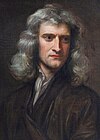Wikipedia:Today's featured article/December 13, 2005
Isaac Newton was an English physicist, mathematician, astronomer, inventor, philosopher and alchemist. A man of profound genius, he is widely regarded as one of the most influential scientists in history. He is associated with the scientific revolution and the advancement of heliocentrism. Among his scientific accomplishments, Newton wrote the Philosophiae Naturalis Principia Mathematica, wherein he described universal gravitation and, via his laws of motion, laid the groundwork for classical mechanics. With Gottfried Wilhelm Leibniz he shares credit for the development of differential calculus. Newton was the first to promulgate a set of natural laws that could govern both terrestrial motion and celestial motion, and is credited with providing mathematical substantiation for Kepler's laws of planetary motion, which he expanded by arguing that orbits (such as those of comets) could include all conic sections (such as the ellipse, hyperbola, and parabola).
Recently featured: Yuan – History of the Jews in Poland – Hugo Chávez

